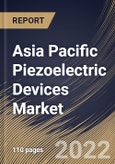The proliferation of piezoelectric technology is a direct result of a number of intrinsic benefits. Up to 106 N/m2, the high elasticity modulus of many piezoelectric materials is equivalent to that of numerous metals. Despite the fact that piezoelectric sensors are electromechanical devices that respond to compression, the sensing components exhibit very low deflection. This provides piezoelectric sensors with durability, a very high natural frequency, and good linearity over a broad range of amplitude.
In addition, piezoelectric technology is immune to electromagnetic fields and radiation, allowing tests to be conducted in challenging circumstances. Some materials, particularly gallium phosphate or tourmaline, are exceptionally stable at high temperatures, allowing sensors to have a temperature range of up to one thousand degrees Celsius. In addition to the piezoelectric effect, tourmaline exhibits pyroelectricity, which is the capacity to create an electrical signal when the heat of the crystal changes. This phenomenon is also typical of piezoceramic substances.
Piezoelectric sensors may also be used to detect odors in the air by monitoring resonance and capacitance concurrently. Electronics that are computer-controlled greatly expand the possible uses for piezoelectric sensors. Piezoelectric sensors are also observed in nature. Researchers believe that the piezoelectric collagen in bone serves as a biological force sensor. Collagen in soft tissues, such as the aortic walls, Achilles tendon, and heart valves exhibits piezoelectricity. A piezoelectric transducer has a very high DC output impedance and may be described as a proportional voltage source as well as a filter network due to its extremely high DC output impedance. The source voltage is exactly proportional to the force, pressure, or strain exerted. The output signal is then connected to this mechanical force in the same manner as if it had traveled through the corresponding circuit.
The regional piezoelectric devices market is estimated to grow at an exponential rate in the coming years. Countries, like China, Japan, and India comprises a very broad and robust manufacturing industry. These countries can also be considered major manufacturing hubs for the production of several important goods. The growth of the piezoelectric devices market in this region can also be attributed to the increasing government initiatives for the expansion of the manufacturing sector in developing countries, the increasing foreign investments in the industrial and manufacturing sector, the growing population, and the presence of a large number of piezoelectric device manufacturers.
The China market dominated the Asia Pacific Piezoelectric Devices Market by Country in 2021; thereby, achieving a market value of $4,537.5 Million by 2028. The Japan market is registering a CAGR of 6% during (2022-2028). Additionally, The India market would showcase a CAGR of 7.3% during (2022-2028).
Based on Element, the market is segmented into Piezoelectric Discs, Piezoelectric Rings, and Piezoelectric Plates. Based on Application, the market is segmented into Aerospace & Defense, Industrial & Manufacturing, Information & Communication, Healthcare, Consumer Electronics, Automotive, and Others. Based on Material, the market is segmented into Piezoelectric Ceramics, Piezoelectric Polymers, Piezoelectric Crystals, and Piezoelectric Composites. Based on Product, the market is segmented into Piezoelectric Actuators, Piezoelectric Transducers, Piezoelectric Generators, Piezoelectric Motors, Piezoelectric Sensors, and Others. Based on countries, the market is segmented into China, Japan, India, South Korea, Singapore, Malaysia, and Rest of Asia Pacific.
The market research report covers the analysis of key stake holders of the market. Key companies profiled in the report include Physik Instrumente (PI) GmbH & Co. KG, Piezo Technologies (Amphenol Corporation), Aerotech, Inc., Mad City Labs, Inc., CeramTec GmbH, APC International, Ltd., Piezosystem Jena GmbH, Dytran Instruments, Inc. (Spectris PLC), CTS Corporation and Kistler Group (Kistler Holding AG)
Scope of the Study
By Element
- Piezoelectric Discs
- Piezoelectric Rings
- Piezoelectric Plates
By Application
- Aerospace & Defense
- Industrial & Manufacturing
- Information & Communication
- Healthcare
- Consumer Electronics
- Automotive
- Others
By Material
- Piezoelectric Ceramics
- Piezoelectric Polymers
- Piezoelectric Crystals
- Piezoelectric Composites
By Product
- Piezoelectric Actuators
- Piezoelectric Transducers
- Piezoelectric Generators
- Piezoelectric Motors
- Piezoelectric Sensors
- Others
By Country
- China
- Japan
- India
- South Korea
- Singapore
- Malaysia
- Rest of Asia Pacific
Key Market Players
List of Companies Profiled in the Report:
- Physik Instrumente (PI) GmbH & Co. KG
- Piezo Technologies (Amphenol Corporation)
- Aerotech, Inc.
- Mad City Labs, Inc.
- CeramTec GmbH
- APC International, Ltd.
- Piezosystem Jena GmbH
- Dytran Instruments, Inc. (Spectris PLC)
- CTS Corporation
- Kistler Group (Kistler Holding AG)
Unique Offerings
- Exhaustive coverage
- The highest number of market tables and figures
- Subscription-based model available
- Guaranteed best price
- Assured post sales research support with 10% customization free
Table of Contents
Companies Mentioned
- Physik Instrumente (PI) GmbH & Co. KG
- Piezo Technologies (Amphenol Corporation)
- Aerotech, Inc.
- Mad City Labs, Inc.
- CeramTec GmbH
- APC International, Ltd.
- Piezosystem Jena GmbH
- Dytran Instruments, Inc. (Spectris PLC)
- CTS Corporation
- Kistler Group (Kistler Holding AG)








